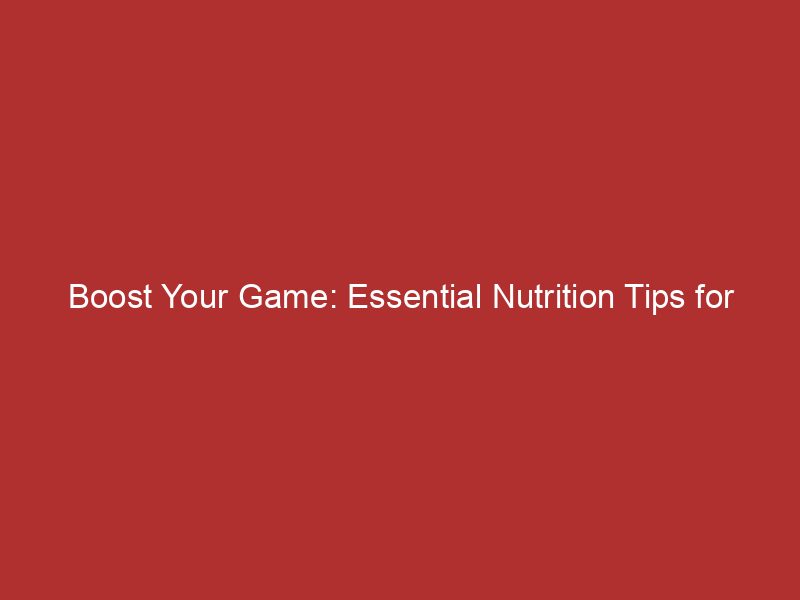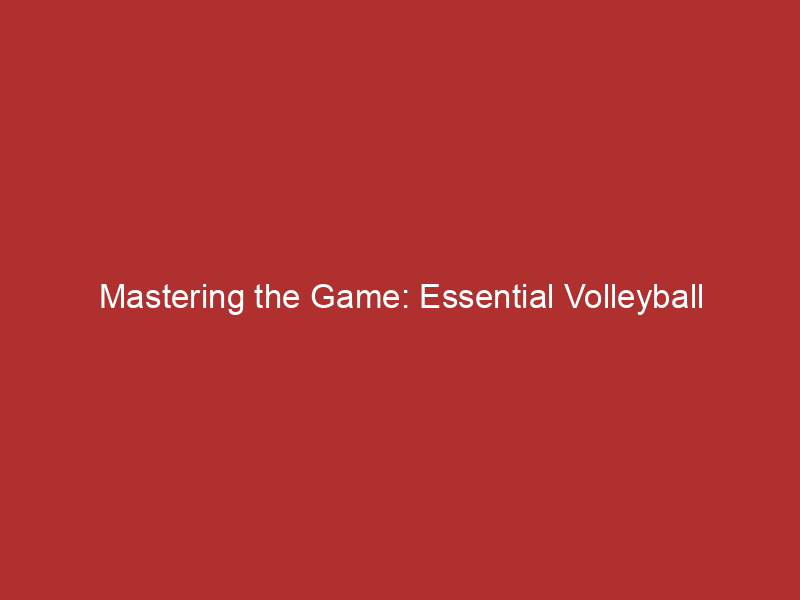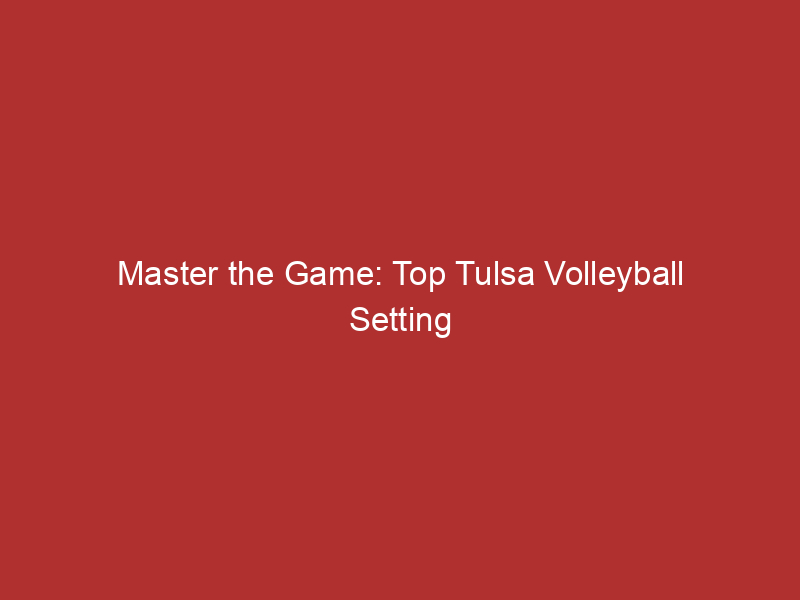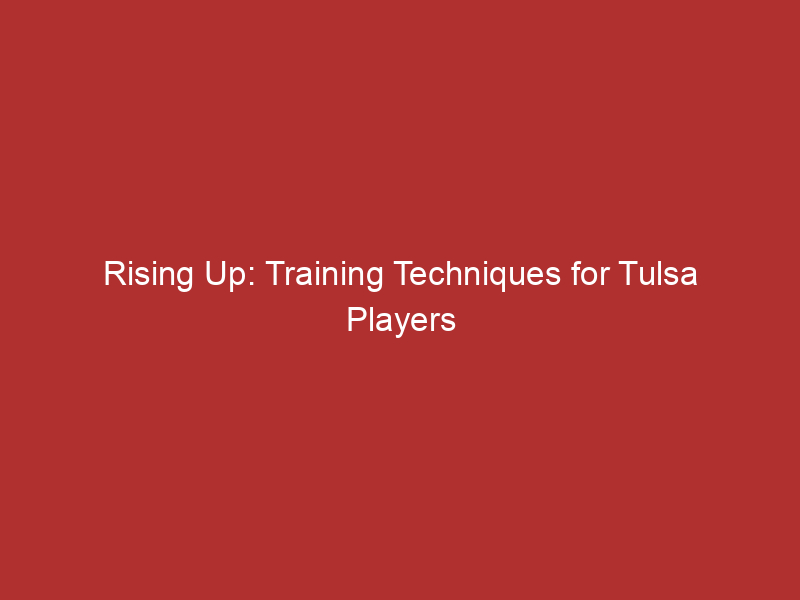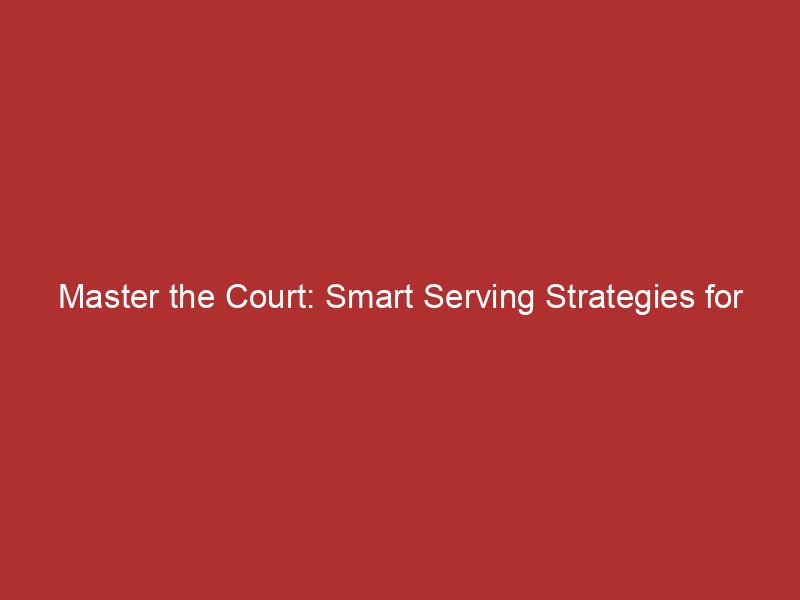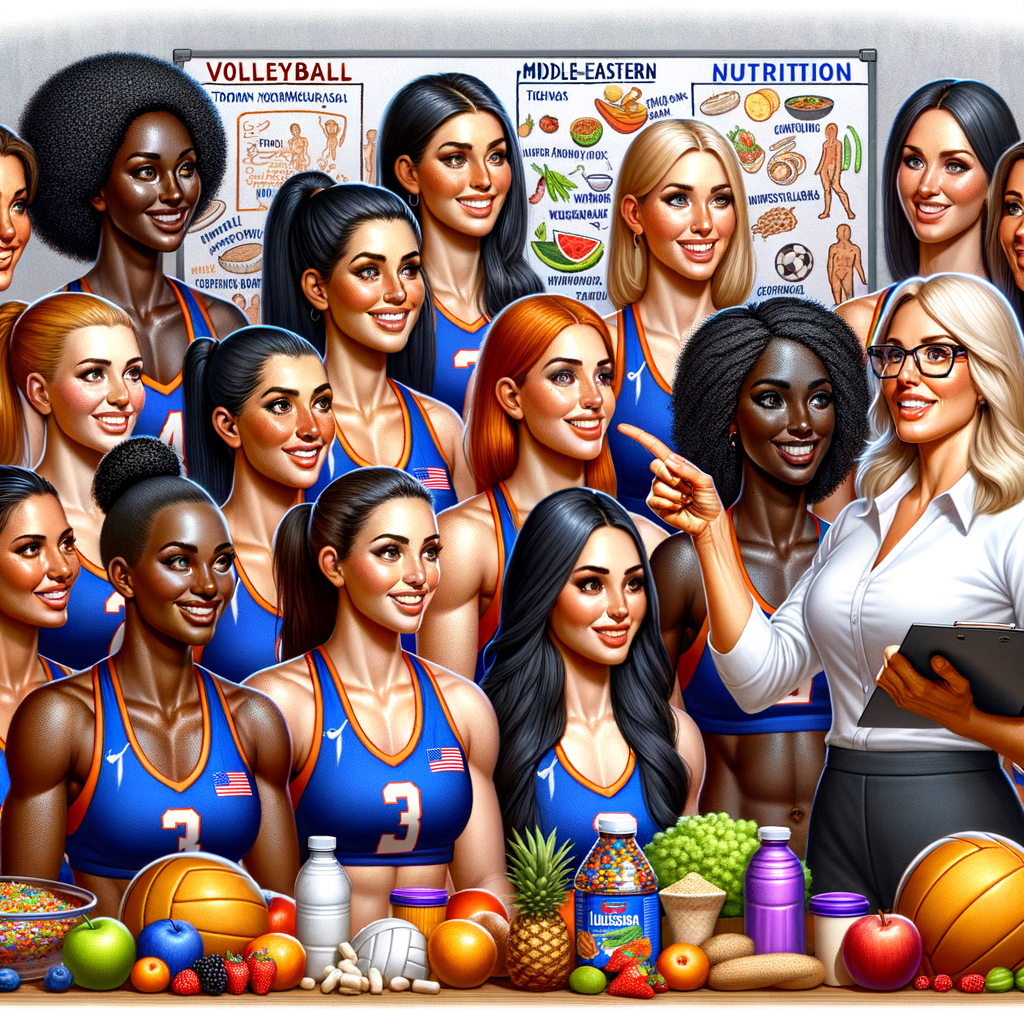
Introduction: The Importance of Nutrition for Volleyball Players
As an athlete, your diet plays a significant role in your performance. This is particularly true for volleyball players, who require a unique blend of strength, endurance, and agility. In this article, we will delve into the importance of nutrition for volleyball players and why a specific diet is essential for them.
- The Role of Nutrition in Sports Performance
- Why Volleyball Players Need a Specific Diet
Nutrition is a key component of any athlete’s performance. It provides the energy needed to train and compete, aids in recovery after exercise, and helps prevent injuries. According to the American College of Sports Medicine, athletes should have a diet rich in carbohydrates, moderate in protein, and low in fat to fuel their performance and recovery.
Volleyball is a high-intensity sport that requires quick bursts of energy. This means volleyball players need a diet that can provide this energy quickly and efficiently. A well-planned diet can help volleyball players maintain their energy levels throughout a match, recover faster after training or games, and reduce the risk of injury. For instance, consuming protein-rich foods after a game can help repair muscle tissue, while carbohydrates can replenish energy stores.
In the following sections, we will delve deeper into the specifics of sports nutrition for volleyball players, providing practical diet tips and highlighting healthy eating habits that can boost your performance on the court. So, whether you’re a seasoned player or just starting out, stay tuned for some valuable insights!
Understanding the Basics of Sports Nutrition in Tulsa
In the world of volleyball, a player’s diet plays a significant role in their performance. Understanding the basics of sports nutrition is crucial for any Tulsa volleyball player aiming to improve their game. Let’s delve into the macronutrients that form the building blocks of a volleyball player’s diet.
Macronutrients: The Building Blocks of a Volleyball Diet
Macronutrients are nutrients that our bodies need in large amounts to function correctly. They include proteins, carbohydrates, and fats. Each of these nutrients plays a specific role in maintaining your health and enhancing your volleyball performance.
- Proteins and their importance for muscle repair
- Carbohydrates as the primary energy source
- Fats for long-term energy and hormone production
Proteins are the building blocks of our bodies. They are essential for muscle repair and growth, which is crucial for volleyball players. After a rigorous game or training session, your muscles need to repair themselves to grow stronger. Consuming enough protein helps speed up this process. The Dietary Reference Intake (DRI) for protein is 46 grams per day for women and 56 grams per day for men.
Carbohydrates are the body’s primary source of energy. They fuel your muscles, allowing you to perform at your best during your volleyball games. When you consume carbohydrates, your body breaks them down into glucose, which is used for immediate energy, or stored in your muscles for later use. The DRI for carbohydrates is 130 grams per day for adults and children.
Fats often get a bad reputation, but they are essential for long-term energy storage and hormone production. They also help your body absorb vitamins. While it’s important to monitor your fat intake, it’s equally important to ensure you’re consuming the right kinds of fats. Unsaturated fats, found in foods like avocados, nuts, and fish, are beneficial for your health. The DRI for fats varies based on age, sex, and life stage, but generally, fats should make up 20-35% of your total daily calories.
By understanding these macronutrients and incorporating them into your diet in the right amounts, you can optimize your performance on the volleyball court. Remember, a balanced diet is key to a successful sports nutrition plan.
Micronutrients: Essential for Overall Health and Performance
While macronutrients like proteins, carbohydrates, and fats are crucial for energy and muscle repair, micronutrients also play a vital role in a volleyball player’s overall health and performance. Micronutrients, which include vitamins and minerals, are necessary for energy production, immune function, bone health, and muscle function. Let’s delve into the specifics.
- Vitamins and their role in energy production and immune function
- Minerals for bone health and muscle function
Vitamins are essential for our bodies to function correctly. They play a significant role in energy production, helping our bodies convert food into energy. B vitamins, for example, are directly involved in energy production and can help improve endurance and athletic performance. B vitamins also support the immune system, which is crucial for athletes who need to stay healthy to perform at their best.
Minerals are just as important as vitamins for a volleyball player’s health and performance. Calcium and phosphorus, for instance, are vital for bone health. A strong skeleton is crucial for volleyball players who are constantly jumping and landing. Magnesium, another essential mineral, supports muscle function, including the heart muscle, and helps with nerve signaling. Magnesium also aids in the metabolism of food and synthesis of proteins, contributing to overall athletic performance.
As a volleyball player, it’s important to ensure your diet includes a variety of foods rich in these essential micronutrients. This will not only boost your performance on the court but also support your overall health and wellbeing.
Practical Volleyball Diet Tips for Tulsa Athletes
As a volleyball player, your diet plays a significant role in your performance on the court. Understanding what to eat and when to eat can help you maximize your energy and recovery. In this section, we will focus on pre-training nutrition advice for Tulsa volleyball players.
Pre-Training Nutrition Advice for Tulsa Players
Before you step onto the court for training, it’s essential to fuel your body with the right nutrients. Let’s delve into why eating before training is important and what you should eat before a volleyball training session.
- Why eating before training is important
- What to eat before a volleyball training session
- Whole grain toast with peanut butter and banana
- A bowl of oatmeal with berries and a scoop of protein powder
- A smoothie made with Greek yogurt, fruits, and a handful of spinach
Eating before training is crucial for volleyball players because it provides the energy needed for the intense physical activity. When you eat, your body breaks down the food into glucose, which is used as fuel for your muscles. Without this fuel, you may feel fatigued and unable to perform at your best. According to a study, athletes who eat before training have better concentration and stamina.
Before a volleyball training session, it’s best to eat a meal that is high in carbohydrates, moderate in protein, and low in fat. Carbohydrates are your body’s primary source of energy, while protein helps with muscle repair and growth. Here are some examples of what you could eat:
Remember to eat your meal 2-3 hours before your training session to give your body time to digest the food and convert it into energy.
By following these practical volleyball diet tips, Tulsa athletes can improve their performance and recovery. Remember, nutrition is just as important as your training, so make sure to prioritize both.
Post-Training Recovery Nutrition
After a rigorous volleyball training session, your body needs the right nutrients to recover and rebuild. This is where post-training nutrition comes into play. It’s not just about eating; it’s about eating the right foods at the right time.
- The Importance of Post-Training Nutrition
- Examples of Ideal Post-Training Meals
- Chicken and Rice: This meal provides a good balance of protein for muscle repair and carbohydrates for energy replenishment.
- Protein Shake and Banana: A protein shake can quickly deliver amino acids to your muscles for repair, while a banana provides quick-digesting carbohydrates to replenish energy.
- Salmon and Quinoa: Salmon is rich in protein and anti-inflammatory omega-3 fatty acids, which can aid recovery. Quinoa is a great source of carbohydrates and fiber.
Post-training nutrition is crucial for volleyball players. It helps replenish the energy stores in your muscles, aids in muscle repair and growth, and enhances recovery. According to a Wikipedia article on sports nutrition, consuming a combination of carbohydrates and protein within 30 minutes after training can significantly improve recovery outcomes.
Choosing the right post-training meal is essential for optimal recovery. Here are a few examples of meals that can help you recover faster and better:
Remember, the goal of post-training nutrition is to aid recovery, replenish energy stores, and prepare your body for the next training session. So, make sure to give your body the nutrients it needs after each training session.
Boosting Volleyball Performance Nutrition
As a volleyball player, your performance on the court is not just about how well you train or how skilled you are. It also depends on your nutrition. In this section, we will focus on how you can boost your volleyball performance through proper nutrition, particularly the use of supplements.
Supplements for Volleyball Players
Supplements can play a crucial role in a volleyball player’s diet. They can help fill nutritional gaps, aid in muscle recovery, and keep you hydrated. Let’s take a look at two key supplements that can benefit volleyball players.
- Protein supplements for muscle recovery
- Electrolyte drinks for hydration
Protein is essential for muscle recovery and growth. After a rigorous game or training session, your muscles need to repair and rebuild, and protein supplements can help speed up this process. A study from the International Society of Sports Nutrition recommends consuming 20-30g of protein after exercise for optimal muscle recovery. You can choose from various protein supplements like whey, casein, or plant-based proteins depending on your dietary preferences.
Staying hydrated is crucial for any athlete, especially for volleyball players who often play in hot and humid conditions. Electrolyte drinks can help replenish the salts lost through sweat, maintain fluid balance, and prevent dehydration. According to the American College of Sports Medicine, athletes should consume a beverage containing sodium and potassium during prolonged exercise to replace the electrolytes lost in sweat.
Remember, while supplements can aid your performance, they should not replace a balanced diet. Always consult with a healthcare professional or a sports nutritionist before starting any supplement regimen.
Hydration: A Key Aspect of Volleyball Performance Nutrition
When it comes to volleyball performance nutrition, hydration plays a crucial role. It’s not just about drinking water; it’s about maintaining the balance of fluids in your body to perform at your best. Let’s delve deeper into the importance of hydration in volleyball performance and how much water a volleyball player should drink.
- The role of hydration in performance
- How much water should a volleyball player drink
Hydration is vital for all athletes, including volleyball players. It helps maintain body temperature, lubricate joints, and transport nutrients to give you energy and keep you healthy. If you’re not hydrated, your body can’t perform at its highest level. Dehydration can lead to fatigue, muscle cramps, dizziness, and other symptoms that can severely impact your performance on the court. According to a Wikipedia article on dehydration, even a small amount of dehydration can affect athletic performance.
While the exact amount can vary depending on factors like your weight, the intensity of your workout, and the weather, a good rule of thumb is to drink at least half of your body weight in ounces each day. For example, if you weigh 150 pounds, aim to drink at least 75 ounces of water daily. During practice or a match, try to drink about 7-10 ounces of water every 10-20 minutes. Remember, it’s essential to stay hydrated not just during the game but throughout the day.
Hydration is a key aspect of volleyball performance nutrition. By understanding its role in performance and how much water you should drink, you can ensure that you’re adequately hydrated and ready to give your best on the court.
Healthy Eating Habits for Tulsa Volleyball Players
For volleyball players in Tulsa, maintaining a healthy diet is just as important as practicing your serves and spikes. Let’s explore how meal planning and preparation can help you achieve your nutritional goals.
Meal Planning and Preparation
Planning and preparing your meals in advance is a great way to ensure you’re getting the right nutrients to fuel your volleyball performance. Let’s delve into the benefits of meal planning and how to prepare a week’s worth of healthy meals.
- Benefits of meal planning for athletes
- How to prepare a week’s worth of healthy meals
Meal planning is not just about saving time and money, it’s also about ensuring you’re eating the right foods to fuel your body for optimal performance. When you plan your meals, you can ensure you’re getting a balance of macronutrients – proteins, carbohydrates, and fats – as well as essential vitamins and minerals. This can help you maintain your energy levels during long volleyball matches and speed up recovery afterwards. According to a Wikipedia article on sports nutrition, athletes who follow a meal plan are more likely to meet their nutritional needs and perform better in their sport.
Preparing a week’s worth of meals might seem daunting, but it’s easier than you think. Start by creating a menu for the week. Include a variety of foods to ensure you’re getting a range of nutrients. Next, make a shopping list and buy all the ingredients you need. Then, set aside a few hours on the weekend to cook and package your meals. You can make large batches of dishes like grilled chicken, steamed vegetables, and brown rice, and then divide them into individual servings. This way, you’ll have healthy meals ready to go for the whole week.
Remember, the key to a successful meal plan is variety and balance. Include a mix of proteins, carbohydrates, and fats in your meals, and don’t forget to hydrate. With a bit of planning and preparation, you can fuel your body for success on the volleyball court.
Maintaining a Balanced Diet
For volleyball players, maintaining a balanced diet is not just about eating healthy foods. It’s about understanding the importance of variety in your diet and learning how to balance macronutrients and micronutrients. Let’s delve into these two crucial aspects.
- Importance of Variety in a Volleyball Diet
- How to Balance Macronutrients and Micronutrients
A varied diet is essential for volleyball players. It ensures that your body gets all the necessary nutrients it needs to perform optimally. A diet that includes a wide range of fruits, vegetables, lean proteins, and whole grains can provide a broad spectrum of nutrients that are beneficial for your health and performance.
For instance, fruits and vegetables are rich in vitamins and minerals that help boost your immune system and aid in recovery. Lean proteins, on the other hand, are crucial for muscle repair and growth. Whole grains provide the energy you need to stay active during your games and training sessions.
Macronutrients and micronutrients play different but equally important roles in your body. Macronutrients, which include carbohydrates, proteins, and fats, are needed in large amounts as they provide the energy you need for your activities. Micronutrients, which include vitamins and minerals, are needed in smaller amounts, but they are crucial for various bodily functions.
To balance these nutrients, you need to understand their functions and the right proportions for your body. For example, carbohydrates should make up about 45-65% of your total daily calories, proteins about 10-35%, and fats about 20-35%. These percentages can vary depending on your specific needs and goals.
As for micronutrients, it’s best to get them from a varied diet rather than supplements. This is because foods often contain a mix of micronutrients that work together to promote health. For instance, oranges provide not only vitamin C but also fiber, potassium, and other nutrients.
Remember, a balanced diet is key to your performance as a volleyball player. It fuels your body, aids in recovery, and helps prevent injuries. So, make sure to include a variety of foods in your diet and balance your intake of macronutrients and micronutrients.
Conclusion: Mastering Your Volleyball Training Diet
As we wrap up this comprehensive guide on nutrition for volleyball players, it’s important to revisit the key points we’ve discussed. A well-balanced diet is crucial for any athlete, and volleyball players are no exception. Let’s recap some of the main dietary tips we’ve covered.
- Recap of key volleyball dietary tips:
- Final thoughts on nutrition for volleyball players:
Remember, the right balance of carbohydrates, proteins, and fats is essential for optimal performance. Carbohydrates provide the energy you need to stay active on the court, while proteins aid in muscle recovery and growth. Fats, though needed in smaller amounts, are also important for energy and nutrient absorption. Hydration is equally important, so ensure you’re drinking enough water before, during, and after your games and training sessions. Lastly, don’t forget the importance of timing your meals and snacks to fuel your body effectively.
Mastering your volleyball training diet is not a one-size-fits-all process. It requires understanding your body’s specific needs and how different foods affect your performance. It’s always a good idea to consult with a sports nutritionist to create a personalized diet plan. Remember, good nutrition is just as important as your training routine. It’s the fuel that powers your performance on the court. So, make smart food choices and see the difference it makes in your game.
In conclusion, a well-planned, balanced diet can significantly enhance your volleyball performance. It’s not just about eating healthy; it’s about eating smart. With the right nutrition, you can boost your energy levels, improve your recovery times, and ultimately, elevate your game. So, start implementing these dietary tips today and master your volleyball training diet.

